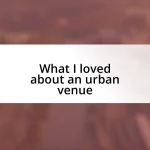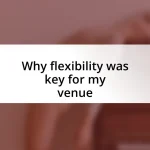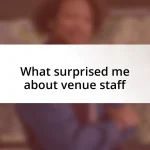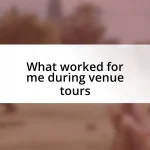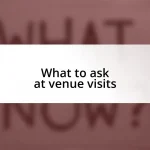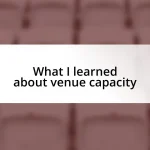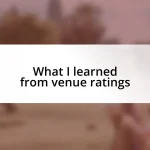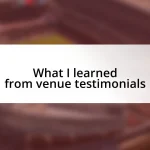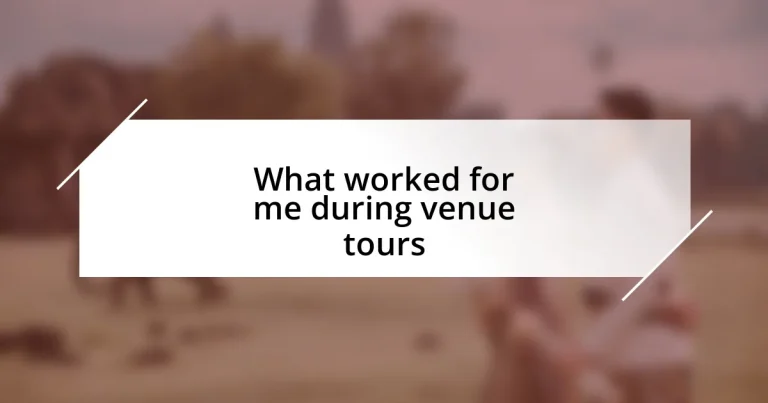Key takeaways:
- Venue tours allow for visualization of the event space, helping to clarify setup and ambiance preferences.
- Preparation is crucial; creating checklists and researching venues enhances decision-making and confidence during tours.
- Assessing emotional connections and practical factors like accessibility and staff engagement are key in selecting a suitable venue.
- Final decisions should balance emotional impact with logistical considerations, trusting gut feelings can often lead to the best choices.
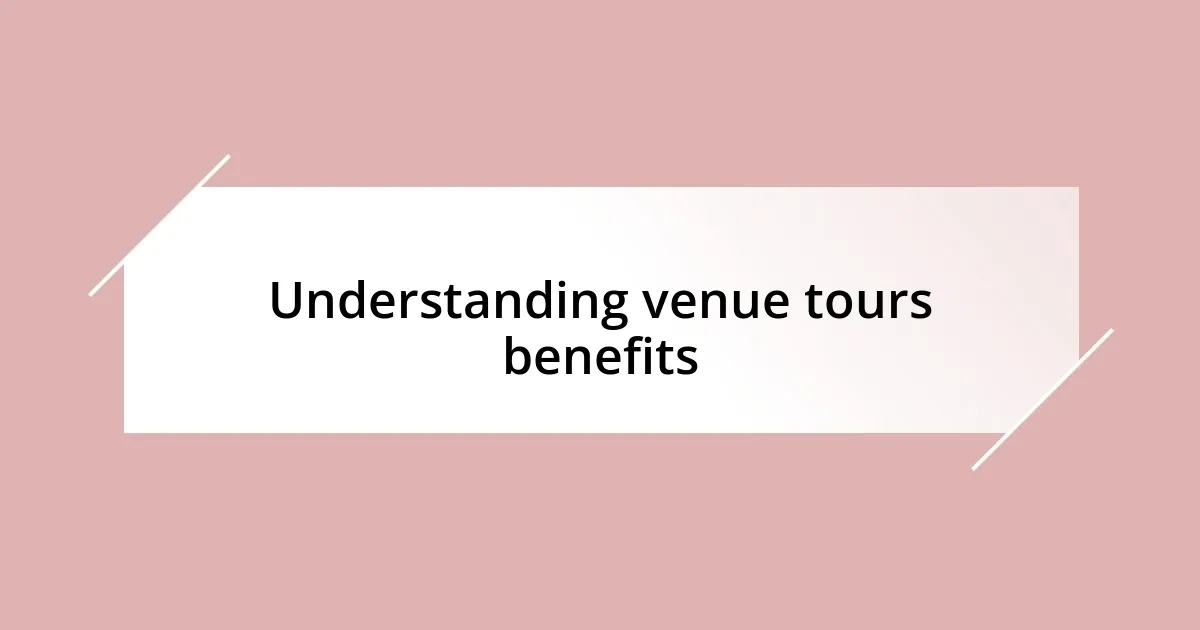
Understanding venue tours benefits
One of the most significant benefits of venue tours is the opportunity to visualize your event in a physical space. I remember the first time I stepped into a venue that had caught my eye online; it was like a light bulb switched on. Suddenly, the potential for my event became so much clearer. Can you imagine the excitement of picturing how everything will come together, from seating arrangements to decor?
Moreover, visiting a venue allows you to gauge its atmosphere and energy. I was once surprised when a space that looked vibrant in photos felt dull and uninspiring in person. This personal experience taught me the importance of ensuring the ambiance matches my vision. Wouldn’t you agree that the right vibe can make or break an event?
Lastly, meeting the staff during a venue tour provides invaluable insights into their level of professionalism and service. I often take note of how attentively they listen and respond to my questions. The warmth you feel can greatly influence your decision. Have you considered how much easier planning becomes when you feel supported by the venue team?
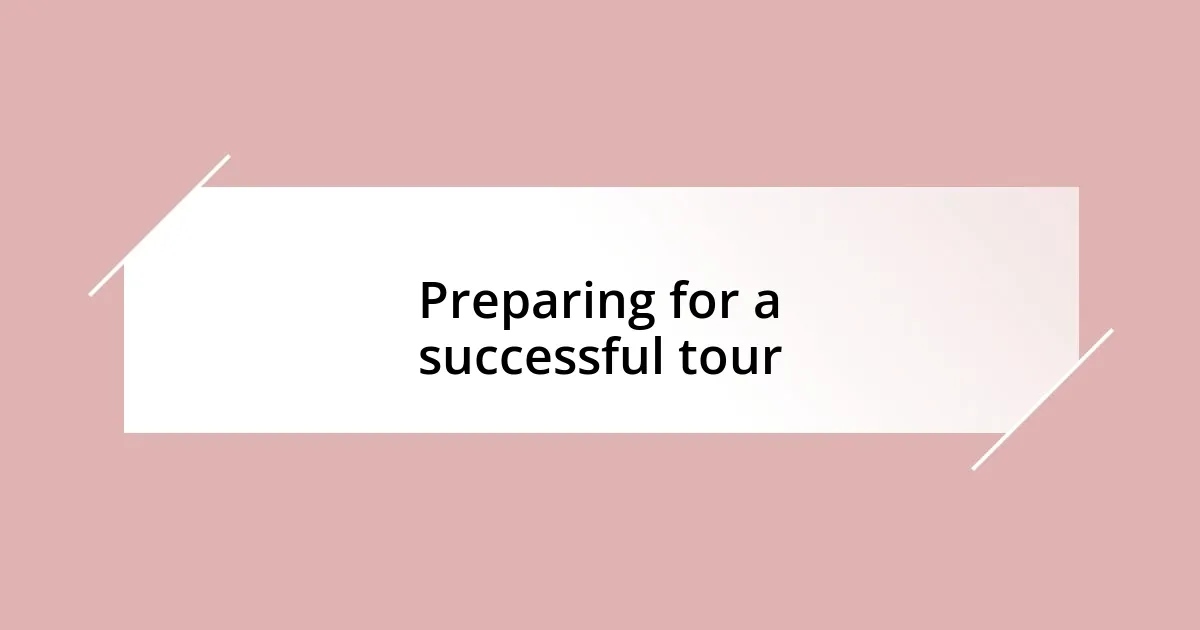
Preparing for a successful tour
Preparing for a successful tour requires careful planning and a clear understanding of your priorities. I recall a time when I visited several venues without a checklist, which led to confusion and frustration. Now, I always create a list of must-haves and deal-breakers for each space. This has saved me from feeling overwhelmed and allows me to focus on what truly matters for my event.
It’s also beneficial to research the venues beforehand. I remember scrolling through reviews and social media pages before a tour, which gave me a helpful context. Knowing what others experienced helped me ask the right questions during my visit. Have you ever felt uncertain about what to inquire? Preparation breeds confidence, and that’s essential for making the most of each venue tour.
Lastly, I highly recommend setting up a follow-up after the tour. Once, I mingled with the venue staff while I was there, and emailed them later with additional questions. This not only clarified my doubts but also fostered a sense of connection. Building rapport can be a game-changer, making future negotiations smoother.
| Preparation Steps | Benefits |
|---|---|
| Creating a checklist | Saves time and focus |
| Researching venues | Informs decision-making |
| Following up with staff | Strengthens relationships |
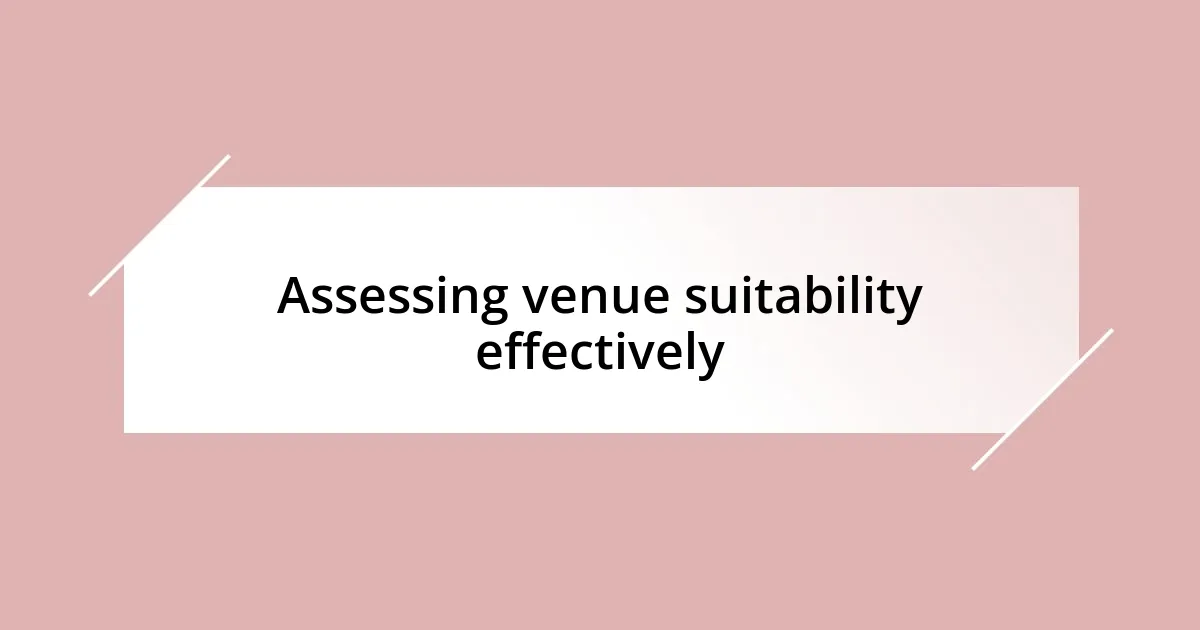
Assessing venue suitability effectively
I’ve found that assessing venue suitability effectively goes beyond just the physical layout; it’s about how the space resonates with my event’s purpose. During one tour, I felt a strong connection to a venue where I could envision laughter and joy. Conversely, I walked into another location and immediately sensed it wouldn’t align with the positive atmosphere I wanted to create. Recognizing these emotional responses can be the key to choosing the right venue.
When I assess a venue, I often consider several vital factors that contribute to overall suitability. Here’s what I typically look for:
- Accessibility: Is the venue easy for attendees to reach?
- Capacity: Does the space comfortably fit my guest list?
- Ambiance: Does the atmosphere mirror the tone of my event?
- Facilities: Are there adequate restrooms, AV equipment, and dining options?
- Staff Engagement: Are the venue staff friendly and attentive?
- Flexibility: Is the space adaptable for various setups or changes?
These elements help me gauge how a venue can serve my specific needs, ensuring I make a choice that feels just right.
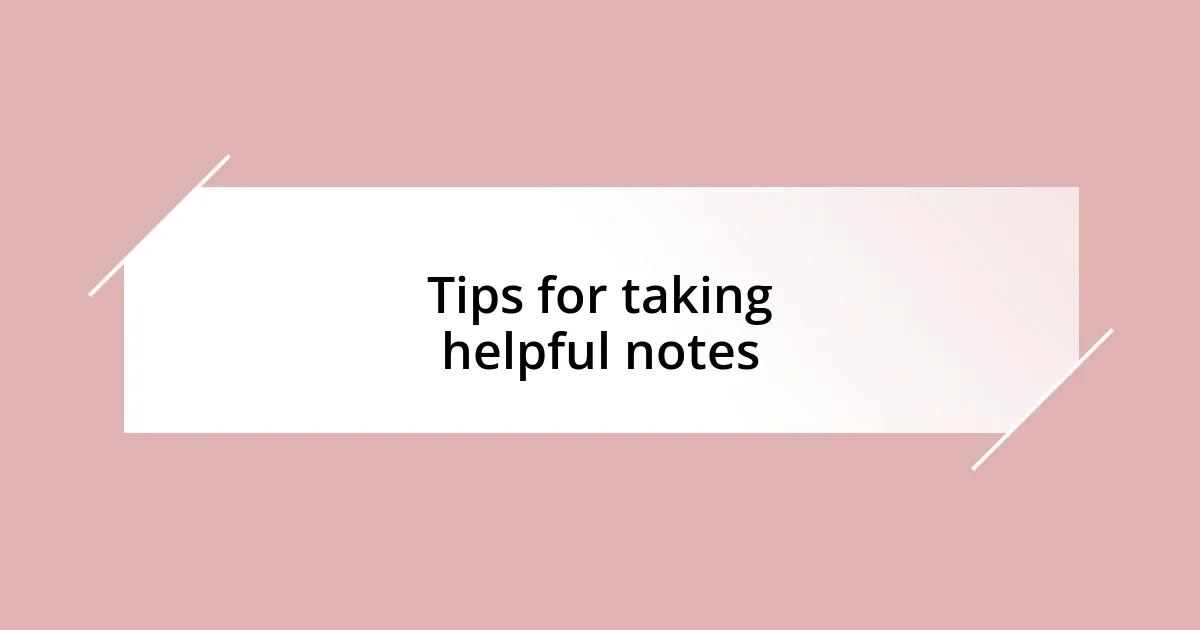
Tips for taking helpful notes
Taking effective notes during venue tours is crucial to making informed decisions later. I’ve discovered that organizing my notes by categories—like layout, ambiance, and impressions—helps me easily reference specific details when I’m comparing different places. One time, I jotted down my immediate feelings right after leaving a venue, and those raw emotions informed my decision more than any checklist could.
I also find it helpful to include visuals in my notes. For example, when I visited an outdoor venue, I sketched a quick layout of the space and noted the lighting at different times of the day. This not only made my notes feel more personal but also gave me a clearer picture of how the venue would function. Have you ever glanced back at your notes and struggled to connect thoughts? Adding visuals or details like lighting and mood can help ensure those memories stay alive.
Lastly, I encourage embracing the digital age—using apps for note-taking can make this process even smoother. I use an app where I can dictate my thoughts or record short snippets during the tour. Just recently, I captured a conversation with the venue manager about their flexibility, and hearing it later helped solidify my confidence in their team. It’s all about creating a toolkit that works for you while keeping the process engaging and relatable.
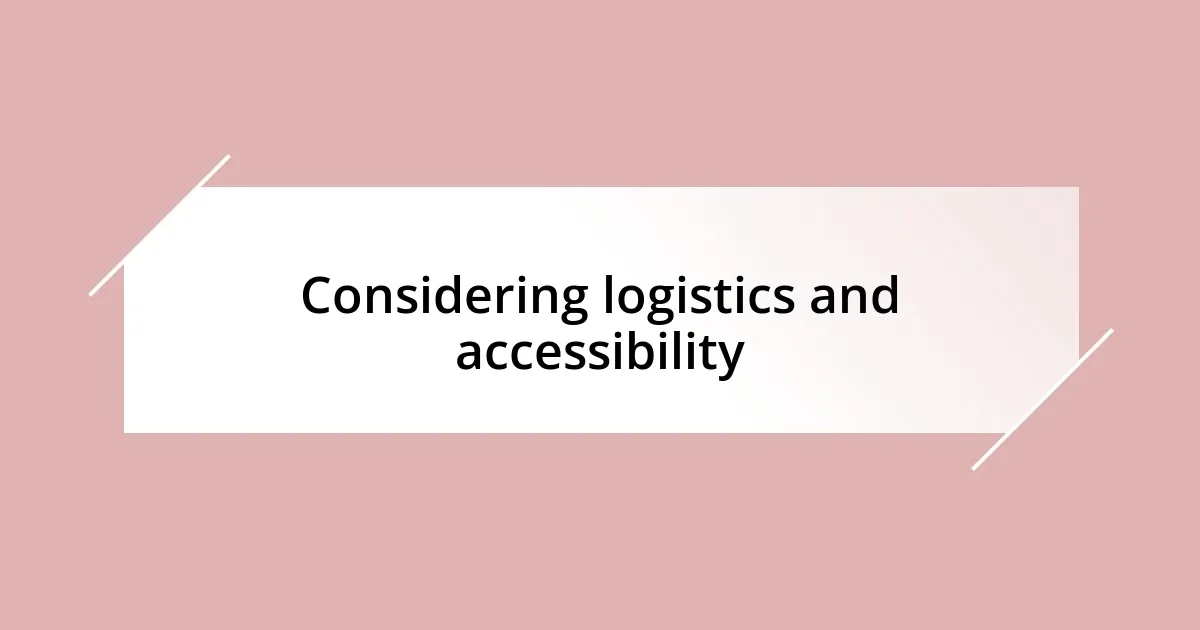
Considering logistics and accessibility
When considering logistics and accessibility, I always ask myself how easy it is for everyone to get to the venue. Recently, I visited a stunning location that seemed perfect until I learned that public transport options were limited. I couldn’t shake the thought of guests struggling to arrive, and that just wouldn’t do. Ensuring that the venue is convenient for all attendees is a priority for me, as their experience starts from the moment they set out to join the event.
I also pay careful attention to the layout of the venue itself. At one venue, I was captivated by its beauty but quickly realized that navigating its winding corridors could be a challenge. Imagine if an elderly guest or someone with mobility issues felt lost or uncomfortable—what a shame that would be! Accessible paths and facilities, like ramps or elevators, are essential components that I assess closely, as they contribute significantly to the comfort of all attendees.
Finally, I make it a point to gauge the venue’s staff capabilities. During one tour, I struck up a conversation with a staff member who shared their experience with accommodating special requests. I left feeling confident that this venue could handle any situation that might arise. Have you ever encountered a venue team that seemed indifferent or unprepared? It can make such a difference to work with people who genuinely care about making your event accessible and enjoyable for everyone involved.
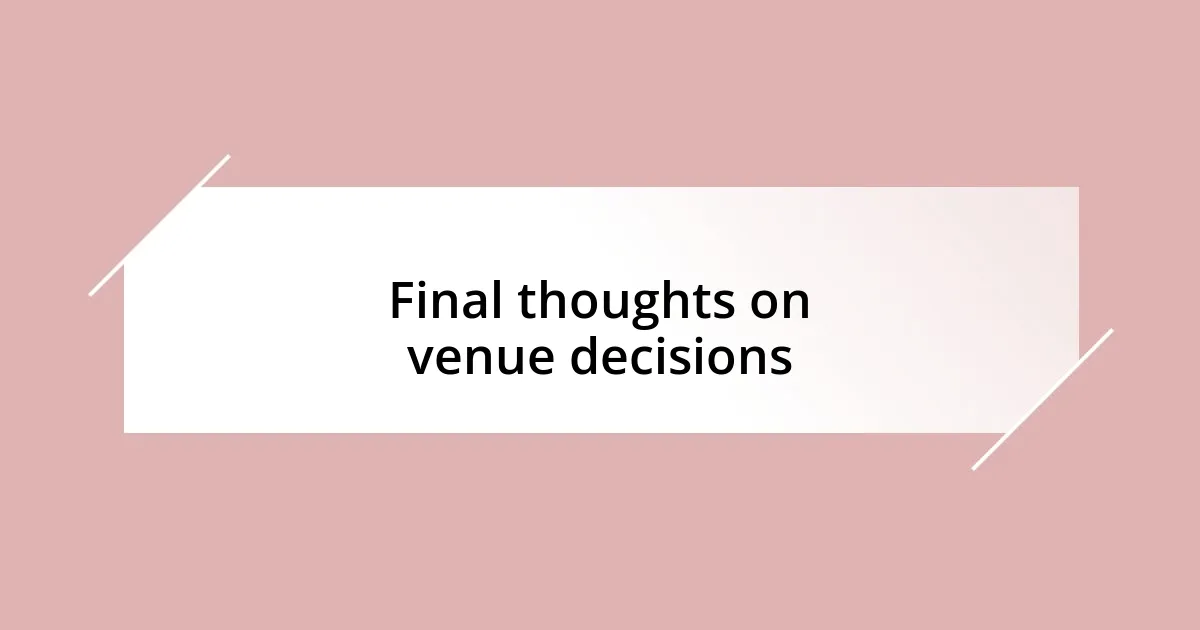
Final thoughts on venue decisions
When it comes to making final decisions about venues, I’ve learned that weighing the emotional impact is just as important as the logistical details. For instance, after touring a rustic barn venue, I found myself utterly enchanted by the vibe, but then I thought about how my guests would react. Will they feel relaxed and welcomed? That emotional connection pushed this venue to the top of my list, reminding me that sometimes, feelings outweigh the metrics.
Another thing I consider is flexibility. Recently, I visited a venue that offered a great package but locked you into a rigid timeline. It left me feeling uneasy—what if something changed last minute? I’ve found that a venue that is open to adjustments can provide a sense of security. After all, events can be unpredictable! Have you ever tried to navigate a tight schedule and wished the venue could offer a little grace? It’s these nuanced factors that can significantly shape the overall experience for everyone involved.
Lastly, my gut feelings have often steered me in the right direction. At one venue, I initially felt unsure during the tour. But as I spoke with the owner, I sensed their passion for creating memorable events. I trusted my instincts, and it turned out to be a wonderful choice! How often do you find yourself second-guessing initial impressions? Trusting my intuition has frequently guided my final venue decisions, reinforcing the idea that a place is more than just a physical space—it’s the people and the vibe that truly make an impact.



